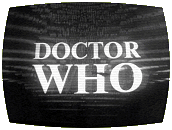 With raids on defenseless cargo beacon stations on the rise in the intergalactic spaceway, the authorities and their minnow ships are placed on high alert. Caven and his motley crew of space pirates have been systematically stealing argonite and escaping aboard their sleek Beta Dart ship. General Hermack, aboard the V-Ship, lays a trap for Caven’s pirates by placing a full team of armed guards on the next cargo station…but to their surprise, their first visitors aren’t pirates, but three odd people who arrive in, of all things, an ancient police box. When the real pirates arrive and the shooting starts, the Doctor, Jamie and Zoe take shelter. Caven’s men slaughter the guards, take the argonie and follow their usual procedure of planting charges to blow the beacon’s wedge-shaped cargo containers apart from each other. Trapped in a different container from the one in which the TARDIS landed, and left with limited oxygen, the Doctor and his friends are rescued by crusty old-time space prospector Milo Clancey – who is unaware that he’s been assigned the rescue mission by Hermack, as a test to see if he is allied to Caven’s pirates.
With raids on defenseless cargo beacon stations on the rise in the intergalactic spaceway, the authorities and their minnow ships are placed on high alert. Caven and his motley crew of space pirates have been systematically stealing argonite and escaping aboard their sleek Beta Dart ship. General Hermack, aboard the V-Ship, lays a trap for Caven’s pirates by placing a full team of armed guards on the next cargo station…but to their surprise, their first visitors aren’t pirates, but three odd people who arrive in, of all things, an ancient police box. When the real pirates arrive and the shooting starts, the Doctor, Jamie and Zoe take shelter. Caven’s men slaughter the guards, take the argonie and follow their usual procedure of planting charges to blow the beacon’s wedge-shaped cargo containers apart from each other. Trapped in a different container from the one in which the TARDIS landed, and left with limited oxygen, the Doctor and his friends are rescued by crusty old-time space prospector Milo Clancey – who is unaware that he’s been assigned the rescue mission by Hermack, as a test to see if he is allied to Caven’s pirates.
written by Robert Holmes
directed by Michael Hart
music by Dudley SimpsonGuest Cast: Briant Peck (Dervish), Dudley Foster (Caven), Jack May (Hermack), Donald Gee (Warne), George Layton (Penn), Nick Zaran (Sorba), Anthony Donovan (Guard), Gordon Gostelow (Milo Clancey), Lisa Daniely (Madeleine), Steve Peters (Guard), Esmond Knight (Dom Issigri)
Note: With the exception of episode 2, the master tapes of this story were destroyed by the BBC in the early 1970’s.
Broadcast from March 8 through April 12, 1969
LogBook entry & review by Earl Green
Review: I’m almost sad to say it, but after reviewing and re-reviewing the sole surviving episode (out of six) that exists in video form, and watching the rest in reconstructed form, we may finally have here, in The Space Pirates, an missing story whose absence is mourned only by the most hardcore fans of Doctor Who. Even when absorbed in the form of the reconstructions created by fans with still photos and surviving audio recordings of all six parts, The Space Pirates is tediously slow – this would’ve been slow with only four episodes. As legend would have it, the BBC modelmakers who constructed and filmed the meticulously accurate models of the Apollo spacecraft for BBC News were contracted for this story, providing perhaps the most realistic vision of space travel seen in Doctor Who up to this point. Too realistic – the almost slow-motion of zero gravity translates to incredibly slow space sequences, bringing the story to a crawl. The model work is impressive for 1969 on a television budget, probably the closest that B&W Who ever came to parity with Star Trek, which was in production at roughly the same time…but man, is it up on the screen for a long time.
Speaking of Star Trek connections, it apparently fell to composer Dudley Simpson to pull it out of the hat and do something to sonically salvage the glut of effects sequences – shades of the task that fell to Jerry Goldsmith ten years later with the first Trek movie. Simpson employs an unusual-for-its-time operatic female vocal in addition to his usual ensemble, but the singer’s voice was processed so much that she sounds like she’s only a couple of steps removed from becoming a theremin. The result is mysterious-going-on-goofy, and makes even the audio-only version of the story a trying listen.
Even attempting to take The Space Pirates seriously can induce a headache. Coming so soon on the heels of much more sophisticated fare like The Invasion, this story is old-fashioned even by Doctor Who standards. With all the characters worrying about the differences between their “rocketships,” and the central female character sporting a gigantic metal helmet custom-molded to protect her towering beehive hairdo, The Space Pirates is an exercise in revisiting the kind of filmed SF cliches that were on their way out of style when Doctor Who premiered. Some 30 years later, Star Trek: Voyager proved that you could be hip by making gentle fun of such elements, but here, Doctor Who was taking it deadly seriously, and even Patrick Troughton and the other cast regulars couldn’t keep it from sinking. The Space Pirates is, in my estimation, a strong contender for the worst of the second Doctor’s era and possibly the entire original series. Perhaps even more embarrassing than all of the above is that this story was wriiten by Robert Holmes, generally acknowledged to be one of the best writers of the original series’ heyday.
